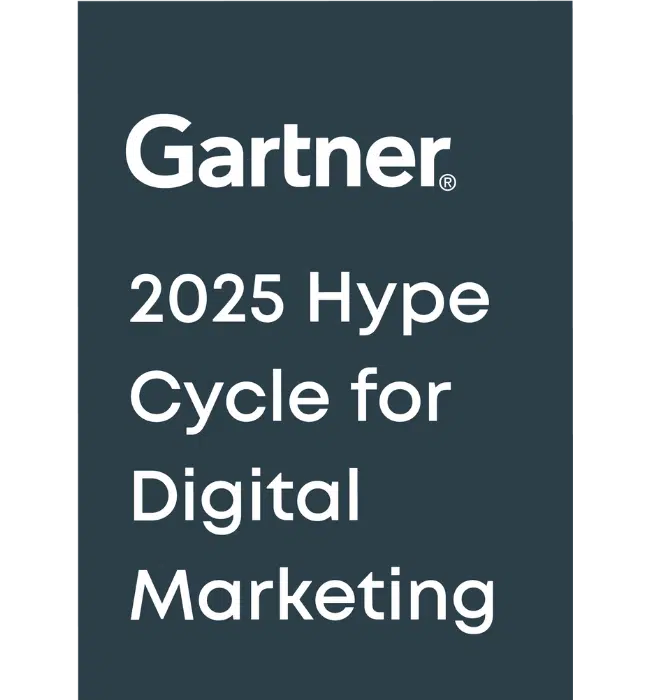The ethical implications of customer data usage are emerging as a defining challenge, and opportunity, for agile, forward-thinking marketers.
With privacy laws fragmented and evolving, uncertainty surrounds what truly constitutes compliant data practices. Meanwhile, AI-driven personalization is accelerating, but ethical data readiness is lagging behind. At the same time, consumer expectations are rising, pushing businesses to re-evaluate their data strategies in light of growing demands for transparency and control.
So how can marketers differentiate themselves by placing ethical data practices at the heart of their strategy?
Recognized in Gartner’s 2025 Hype Cycle for Digital Marketing, customer data ethics is emerging as a core strategic principle. This blog explores what customer data ethics entails, how marketers can honor consumer privacy demands, and why Consent and Preference Management is becoming a critical tool for permission-based, preference-driven engagement.
Jump to:
- Ethics beyond compliance
- The privacy-personalization paradox
- Why Consent and Preference Management is the missing link
Ethics beyond compliance
With growing pressure from data protection regulators, marketers are scrambling to implement engagement tactics that not only convert but do so in a way that honors consumer privacy choices.
Yet, true differentiation doesn’t rely on what’s legally permissible but comes from embedding ethical principles into the roots of marketing strategy.
Ethical marketing asks deeper questions:
- Is this data use aligned with our brand values?
- Would our customers feel respected and informed?
- Are we building trust, or just avoiding penalties?
Campaigns grounded in ethics are more likely to facilitate long-term loyalty, reduce reputational risk, and resonate with increasingly privacy-conscious audiences.
The privacy-personalization paradox
The privacy-personalization paradox sits at the heart of modern marketing, where the demand for tailored experiences collides with growing concerns over data privacy.
Consumers expect content that resonates, messaging that reflects their needs, and experiences tailored to their context and intent. Without a solid personalization strategy, marketers risk campaigns that miss the mark; leading to lower engagement, reduced performance, and declining ROI.
And this isn’t just a theory. Insights from McKinsey show that 71% of consumers expect personalization by default, with 76% of consumers more inclined to purchase from brands that do. Where personalization exists, conversion often follows.
But the privacy-personalization paradox can’t be ignored. Personalization depends on data, and data use demands privacy. The more tailored the experience, the more personal data is required, and that raises critical questions about consent, transparency, and ethical boundaries.
Marketers must walk a fine line. On one side is the promise of AI-powered personalization; on the other is the responsibility to protect customer privacy.
The solution lies within building personalization strategies on a foundation of consented, ethically sourced data. This means:
- Using data that customers have willingly and knowingly shared
- Ensuring data usage aligns with customer expectations
- Prioritizing trust and transparency in every campaign.
Why Consent and Preference Management is the missing link
Where personalization drives performance and privacy drives trust, Consent and Preference Management (CPM) platforms offer marketers a practical way to balance both; going beyond compliance to offer ethical, preference-driven engagement initiatives.
Providing the means of collecting granular preferences from consumers, from communication frequency to preferred topics, Consent and Preference Management empowers marketers to deliver truly personalized experiences that respect individual boundaries.
By aligning engagement with what customers actually want and expect CMPs help build trust, improve relevance, and drive performance, all while staying compliant in a shifting regulatory landscape.
Here’s how a CMP can help marketers turn ethical intent into strategic action:
- Operationalizing ethics: Consent and Preference Management helps marketers move from intention to execution, embedding customer choice into every touchpoint.
- Supporting segmentation and automation: By capturing granular preferences, CMP tools enable smarter audience segmentation based on customer preferences, enabling conversion-focused campaigns.
- Aligning with regulatory demands: As data privacy laws evolve, CPM platforms provide a flexible foundation for compliant, customer-centric marketing.
Key takeaways
For marketers navigating the intersection of privacy, personalization, and performance, customer data ethics should form the foundation of any successful strategy. Here’s what to keep in mind:
- Ethics is strategic: Go beyond compliance to build trust and brand value.
- Transparency is essential: Fragmented laws and rising expectations demand clarity.
- Personalization needs consent: AI-driven campaigns must be built on ethically sourced data.
- CPM tools are critical. They help marketers:
- Embed ethics into engagement
- Enable smarter segmentation
- Build trust through control and transparency
- Stay agile amid changing regulations.
By embedding ethical principles into every layer of marketing strategy, brands can unlock a powerful trifecta: trust, relevance, and resilience. Trust builds loyalty. Relevance drives conversion. Resilience ensures agility in the face of regulatory change.
The future of marketing belongs to those who treat data not just as a resource, but as a relationship. And relationships, like reputations, are built on respect.


